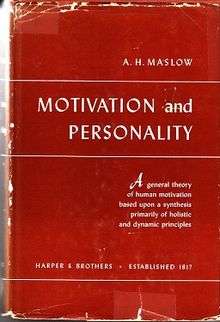Motivation and Personality (book)
 Cover of the first edition | |
| Author | Abraham Maslow |
|---|---|
| Language | English |
| Subject | Psychology |
| Publisher | Harper & Brothers |
Publication date | 1954 |
| Media type | |
| Pages | 411 |
| ISBN | 9780060419875 |
Motivation and Personality is a book on psychology by Abraham Maslow, first published in 1954. Maslow's work deals with the subject of the nature of human fulfillment and the significance of personal relationships, implementing a conceptualization of self-actualization.[1] Underachievers have a need for social love and affection, but a self-actualized person has these "lower" needs gratified and is able to pursue his or her own path towards self-actualization.[2]
Maslow's book is perhaps the best known contemporary work on human needs. Maslow postulated a hierarchical pyramid of human needs stretching from basic physical needs at the bottom to spiritual or transcendental needs at the top.[3]
In Motivation and Personality, Maslow argues that, in order for individuals to thrive and excel, a health-fostering culture must be created.[4] Maslow is among the psychological theorists who believe that when parents fail to provide a safe, nurturing environment, their children will develop deep feelings of insecurity.[5] Maslow considers human beings to be energized by an actualizing tendency and believe that well-being occurs to the extent people can freely express their inherent potentials.[6]
See also
References
- ↑ Knapp, Robert R. "Relationship of a measure of self-actualization to neuroticism and extraversion." Journal of Consulting Psychology 29, no. 2 (1965): 168.
- ↑ Leib, Jere W., and William U. Snyder. "EFFECTS OF GROUP DISCUSSIONS ON UNDERACHIEVEMENT AND SELF-ACTUALIZATION." Journal of Counseling Psychology 14, no. 3 (1967): 282.
- ↑ Jackson, Tim, and Nic Marks. "Consumption, sustainable welfare and human needs—with reference to UK expenditure patterns between 1954 and 1994." Ecological Economics 28, no. 3 (1999): 421-441.
- ↑ Froh, Jeffrey J. "The history of positive psychology: Truth be told." NYS Psychologist 16, no. 3 (2004): 18-20.
- ↑ Kasser, Tim, and Kennon M. Sheldon. "Of wealth and death: Materialism, mortality salience, and consumption behavior." Psychological science 11, no. 4 (2000): 348-351.
- ↑ Kasser, Tim, and Richard M. Ryan. "A dark side of the American dream: correlates of financial success as a central life aspiration." Journal of Personality and Social Psychology 65, no. 2 (1993): 410.